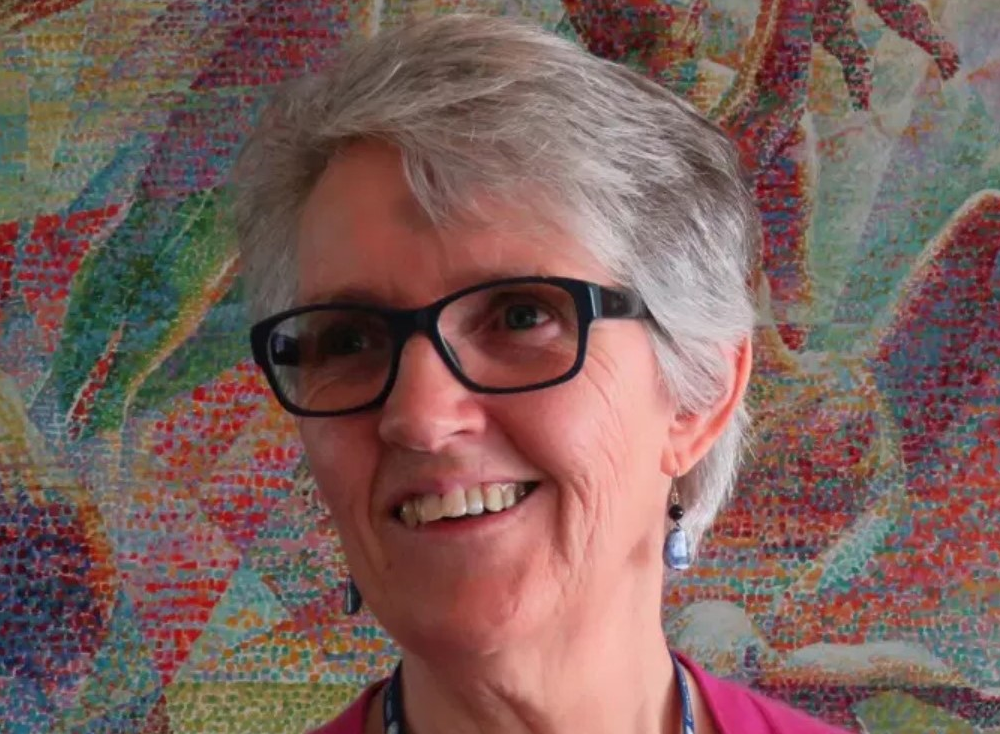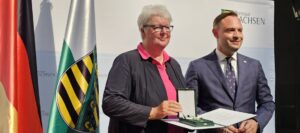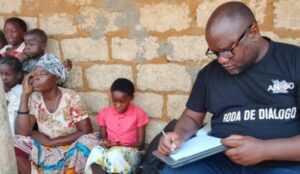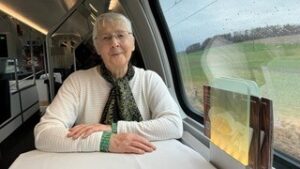By Liam Michael Quinn, Communications Manager
After 16 years of dedicated service, next month Sr Winifred Doherty will step away from her role as the Good Shepherd International Justice and Peace Office Main NGO Representative to the United Nations. During this month of May, many in-person and virtual events have been held throughout our global Congregation to celebrate and give thanks for her remarkable achievements.
The Communications Office is grateful to Sr Winifred for recently having taken the time to be interviewed, which we share with you here.
“Justice is an integral part of our mission of reconciliation.” (25th Congregational Chapter)
LMQ: What does our Special Consultative Status with the Economic and Social Council (ECOSOC) at the United Nations (UN) mean for us as a religious Congregation?
WD: For me, our voice at the United Nations is rooted in my living and responding to the Gospel within the evolving history of the Church and religious congregations over my 57 years of religious life.
When I joined Our Lady of Charity of the Good Shepherd in 1967 two years after the Second Vatican Council, I recall finding the opening lines of the document Gaudium and Spes both inspirational and challenging: “The joys and the hopes, the griefs and the anxieties of the [people] of this age, especially those who are poor or in any way afflicted, these are the joys and hopes, the griefs and anxieties of the followers of Christ.”
The later Congregational Chapter of 1973, “keenly aware of the obligations to give witness in our lives to justice and authentic poverty” called us to “work for the reform of social structures, particularly those that are dehumanizing.”
This was further elaborated in 1985 in the 25th Congregational Chapter’s Declaration on Social Justice when we were “urged to new responses in relation to Social Justice… and to participate in actions and organizations that favor social justice according to the orientation of the Church and the Congregation.”
I believe this was the birth of our journey which culminated with us obtaining Special Consultative Status with the Economic and Social Council of the United Nations in 1996.
At that time, I was a missionary in Addis Ababa, Ethiopia, and was asked to represent the Congregation at the Economic Commission for Africa, which has its headquarters in Addis Ababa.
On taking up the position as Main NGO Representative in New York in 2008 I coined the term ‘Gospel Space’ to express my feelings that the engagement of faith-based organizations and religious congregations at the United Nations is important because the daily and annual agenda rotates around issues that were of most concern to Jesus – persons living in poverty, hunger, people in need of healing and all who were marginalized and excluded including girls and women.
And how is our voice different from the other organizations and congregations?
Our charism is one of many unique charisms that find expression within the Church. I believe that we bring the compassion and ‘life in abundance’ that Jesus offered to girls, women, and children.
This may not be unique today in a feminist world – in a world that is actively advocating for gender equality and the empowerment of girls and women. But there is a facet of this generalized ministry and advocacy for gender equality that is unique and finds its origin in St John Eudes when he was challenged by Madeleine Lamy as to what he was doing for women in situations of prostitution.
This is the challenge – as real today in the 21st century as it was in the 17th century. Girls and women are demeaned, belittled, disempowered, and violated in a system that condones the buying of sex and seeks to legalize the ‘sex trade’, and the commercial sexual exploitation of girls and women.
While our global ministries and networks provide awareness and services, to prevent and protect, our advocacy position must specifically target all those who seek to sexually exploit another person. ‘Sex work’ is not decent work but violence perpetrated mostly on people living in poverty and those who are marginalized.
Being present at the United Nations enables the Congregation to collaborate with like-minded organizations to change this egregious crime.
What one outcome are you most proud of?
Since the Office was established 28 years ago, we have become well-known for our position and track record in addressing the injustices experienced by girls, women, and children.
Vulnerability to being exploited is a consequence of poverty and so our persistent advocacy for the implementation of universal social protections for all is concurrent with ending violence against women. It is two sides of the same coin.
Our advocacy work has contributed to this issue now being on every agenda of the UN.
As you look forward to your retirement, what memorable events will you take with you?
These years as the NGO Representative have been a blessed and privileged time not without their challenges. But holding this role of leadership – not just within the Congregation but within various NGO committees and coalitions – has been immensely rewarding.
Some of the many memorable events include the UN visits of Pope Benedict in April 2008 and Pope Francis in September 2015, being involved in and celebrating the establishment of UN Women in 2010, the development of a survivor’s movement founded in 2012 with a global advocacy voice and being present in the gallery of the Security Council in 2019 when Nadia Murad – a Yazidi woman – witnessed the first-ever hearing by the UN Security Council on sexual violence in conflict.
I also fondly recall having spoken on panels at the UN and elsewhere on the issue of human trafficking, social protection, and ending violence against girls and women, such as at the high-level meeting of the General Assembly on the appraisal of the United Nations Global Plan of Action to Combat Trafficking in Persons on 28 September 2017.
A very memorable time for me was the two-year process that culminated in 2015 with the 2030 Agenda for Sustainable Development and its 17 Sustainable Development Goals. This was a high point for the many NGOs who engaged with member states to create a global framework for sustainable development, a roadmap for the future. It was a peak experience of multilateralism at its best.
My best memories have been when the GSIJP Office has engaged with our ministries at the country level – empowering and facilitating girls and women to present issues at the global level which are relevant to them through attending commissions and engaging as panelists at parallel events.
It has been particularly gratifying for me to create synergies in the advocacy world through moments when the Good Shepherd International Foundation, NGO regional designates, justice and peace contacts, or partners-in-mission have taken up the gauntlet and attended UN, regional, or national events.
Finally, I will cherish the memories with my office colleagues – Cecilie Kern, Alexis Schutz, and Kimberly Happich Moloche – who I feel blessed to have shared this journey with.
How do you see the journey of the GSIJP Office evolve into the future?
In a Congregation experiencing both new life and diminishment, I think that our ministry of advocacy at the United Nations will remain of fundamental importance.
In the GSIJP Office, hangs a quote from the late Australian Sr Barbara Davis, which reads
The Shepherd as the one who fights off the ravaging attack of the wolf, even at the cost of his life, is a far more daunting, perhaps less attractive image than that of the Shepherd looking for the lost sheep or lamb and carrying it on his shoulders. But it represents one of the very necessary tasks of anyone who calls herself a good shepherd.
To fight off a wolf, one cannot possibly at the same time cuddle the lamb. To perform the function of nurturing and caring is very important, but there are times when it is necessary to turn attention and give one’s energy to the struggle against what oppresses and threatens. It is because of the value of the sheep, because the shepherd prizes them so highly, that he enters into this struggle.[1]
Fighting off the wolf in the systems and structures that dehumanize and impoverish both people and the planet is no easy task, and not for the faint-hearted. But advocacy work with its long, tedious, and repetitive interactions is nourished and sustained by our fourth vow of zeal.
Meaningful engagement is not short-term: this long-term work is a vocation within a vocation. Our advocacy work can often show few rewards in the short term, but with sustained momentum, it can move mountains.
My vision of the role of the Office in the future is an enhanced role, building on the expertise already gleaned, with adequate personnel and resources to engage as a leader in advocacy within the NGO world as a meaningful partner in ‘Co-creating our Future’ within the Congregation.
[1] Sr Barbara Davis, We are Caught into Mystery, https://www.goodshepherdmyanmar.org/wp-content/uploads/2018/10/eWe-are-caught-into-this-mystery-en-Copy.pdf






